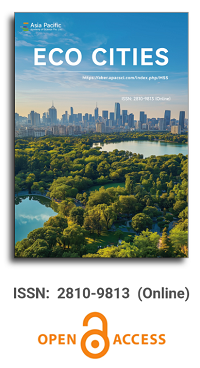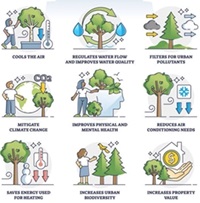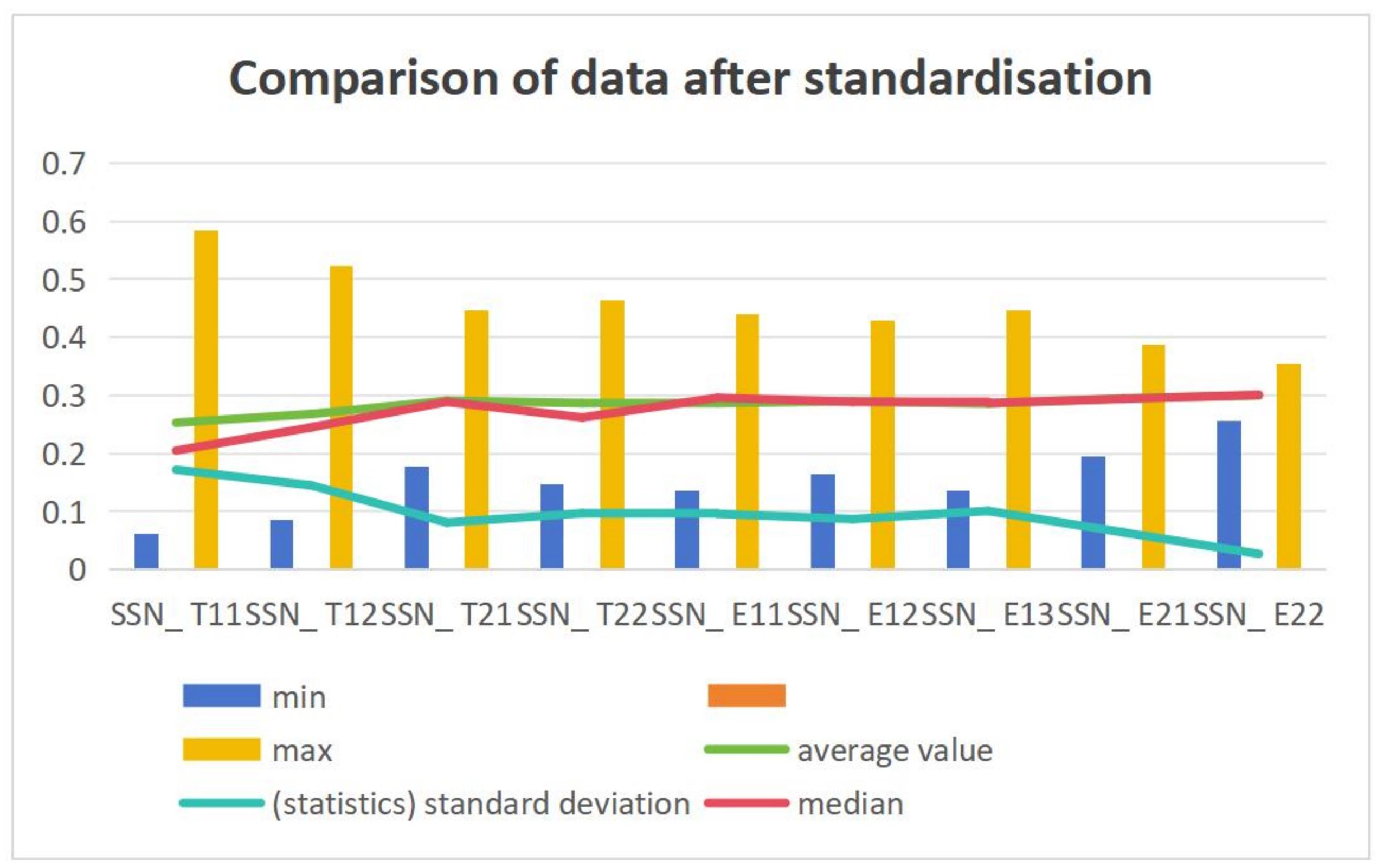


Feasibility and effects of GIS-based municipal solid waste vehicle routing for Bahrain
Vol 4, Issue 1, 2023
Download PDF
Abstract
In the realm of waste management, efficient route optimisation for municipal solid waste (MSW) collection is becoming increasingly crucial, particularly for developing nations with budgetary considerations. This study leverages the capabilities of the geographic information system (GIS) and integrates the Dijkstra algorithm to enhance route optimisation for MSW vehicles in Bahrain. Utilising comprehensive local vehicle routing data from Urbaser and applying GIS methodologies, three distinct areas in Bahrain were methodically analysed. The results revealed a notable 55% reduction in travel distance, a 17% decrease in time, and a yearly fuel cost saving of 6405 BHD (16,974 USD) in the optimal scenario. Given these findings, the potential applicability of this optimisation algorithm extends beyond Bahrain, suggesting significant benefits for regions with similar challenges. To further refine this approach, the integration of real-time traffic data into the routing algorithm is recommended. Other additions to the optimization process could include additional parameters such as safety.
Keywords
References
- Kaur A, Bharti R, Sharma R. Municipal solid waste as a source of energy. Materialstoday: Proceedings 2023; 81: 904–915. doi: 10.1016/j.matpr.2021.04.286
- Kaza S, Yao LC, Bhada-Tata P, Van Woerden F. What a Waste 2.0: A Global Snapshot of Solid Waste Management to 2050. World Bank; 2018.
- Roy H, Alam SR, Bin-Masud R, et al. A review on characteristics, techniques, and waste-to-energy aspects of municipal solid waste management: Bangladesh perspective. Sustainability 2022; 14(16): 10265. doi: 10.3390/su141610265
- Oduro-Appiah K, Afful A, Kotey VN, De Vries N. Working with the informal service chain as a locally appropriate strategy for sustainable modernization of municipal solid waste management systems in lower-middle income cities: Lessons from Accra, Ghana. Resources 2019; 8(1): 12. doi: 10.3390/resources8010012
- Whiteman A, Webster M, Wilson DC. The nine development bands: A conceptual framework and global theory for waste and development. Waste Management & Research 2021; 39(10): 1218–1236. doi: 10.1177/0734242X211035926
- Qiao Q, Tao F, Wu H, et al. Optimization of a capacitated vehicle routing problem for sustainable municipal solid waste collection management using the PSO-TS algorithm. International Journal of Environmental Research and Public Health 2020; 17(6): 2163. doi: 10.3390/ijerph17062163
- Akbarpour N, Salehi-Amiri A, Hajiaghaei-Keshteli M, Oliva D. An innovative waste management system in a smart city under stochastic optimization using vehicle routing problem. Soft Computing 2021; 25: 6707–6727. doi: 10.1007/s00500-021-05669-6
- Dao-Tuan A, Nguyen-Thi-Ngoc A, Nguyen-Trong K, et al. Optimizing vehicle routing with path and carbon dioxide emission for municipal solid waste collection in Ha Giang, Vietnam. In: Chen Y, Duong T (editors). Industrial Networks and Intelligent Systems, Proceedings of the INISCOM 2017: Lecture Notes of the Institute for Computer Sciences, Social Informatics and Telecommunications Engineering; 4 September 2017; Ho Chi Minh City, Vietnam. Springer, Cham; 2018. Volume 221, pp. 212–227.
- Yadav V, Karmakar S. Sustainable collection and transportation of municipal solid waste in urban centers. Sustainable Cities and Society 2020; 53: 101937. doi: 10.1016/j.scs.2019.101937
- Sulemana A, Donkor EA, Forkuo EK, Oduro-Kwarteng S. Optimal routing of solid waste collection trucks: A review of methods. Journal of Engineering 2018; 2018: 4586376. doi: 10.1155/2018/4586376
- Ferronato N, Alarcón GPP, Lizarazu EGG, Torretta V. Assessment of municipal solid waste collection in Bolivia: Perspectives for avoiding uncontrolled disposal and boosting waste recycling options. Resources, Conservation and Recycling 2021; 167: 105234. doi: 10.1016/j.resconrec.2020.105234
- Aliahmadi SZ, Barzinpour F, Pishvaee MS. A fuzzy optimization approach to the capacitated node-routing problem for municipal solid waste collection with multiple tours: A case study. Waste Management & Research 2020; 38(3): 279–290. doi: 10.1177/0734242X19879754
- Louati A, Son LH, Chabchoub H. Smart routing for municipal solid waste collection: A heuristic approach. Journal of Ambient Intelligence and Humanized Computing 2019; 10: 1865–1884. doi: 10.1007/s12652-018-0778-3
- Kamal MA, Youlla D. Municipal solid waste transportation optimisation with vehicle routing approach: Case study of Pontianak City, West Kalimantan. IOP Conference Series: Earth and Environmental Science 2018; 131: 012057. doi: 10.1088/1755-1315/131/1/012057
- Vu HL, Ng KTW, Bolingbroke D. Parameter interrelationships in a dual phase GIS-based municipal solid waste collection model. Waste Management 2018; 78: 258–270. doi: 10.1016/j.wasman.2018.05.050
- Singh S, Behera SN. Development of GIS-based optimization method for selection of transportation routes in municipal solid waste management. In: Kalamdhad A, Singh J, Dhamodharan K (editors). Advances in Waste Management. Springer, Singapore; 2018. pp. 319–331.
- Sanjeevi V, Shahabudeen P. Optimal routing for efficient municipal solid waste transportation by using ArcGIS application in Chennai, India. Waste Management & Research 2016; 34(1): 11–21. doi: 10.1177/0734242X15607430
- Vu HL, Bolingbroke D, Ng KTW, Fallah B. Assessment of waste characteristics and their impact on GIS vehicle collection route optimization using ANN waste forecasts. Waste Management 2019; 88: 118–130. doi: 10.1016/j.wasman.2019.03.037
- Amal L, Son LH, Chabchoub H, Lahiani H. Analysis of municipal solid waste collection using GIS and multi-criteria decision aid. Applied Geomatics 2020; 12: 193–208. doi: 10.1007/s12518-019-00291-6
- Mai CV, Nguyen SH, Dao CD, et al. A GIS application in optimizing the collection and transportation route of domestic solid waste in Hue City, Vietnam. In: Nguyen AT, Hens L (editors). Global Changes and Sustainable Development in Asian Emerging Market Economies. Springer, Cham; 2021. pp. 599–609.
- Vishnuvardhan K, Elangovan K. Optimal Route Analysis for Solid Waste Transportation Using GIS and ANN [PhD thesis]. Anna University; 2021.
- Blazquez C, Paredes-Belmar G. Network design of a household waste collection system: A case study of the commune of Renca in Santiago, Chile. Waste Management 2020; 116: 179–189. doi: 10.1016/j.wasman.2020.07.027
- Bányai T, Tamás P, Illés B, et al. Optimization of municipal waste collection routing: Impact of industry 4.0 technologies on environmental awareness and sustainability. International Journal of Environmental Research and Public Health 2019; 16(4): 634. doi: 10.3390/ijerph16040634
- Nesmachnow S, Rossit D, Toutouh J. Comparison of multiobjective evolutionary algorithms for prioritized urban waste collection in Montevideo, Uruguay. Electronic Notes in Discrete Mathematics 2018; 69: 93–100. doi: 10.1016/j.endm.2018.07.013
- Akhtar M, Hannan MA, Begum RA, et al. Backtracking search algorithm in CVRP models for efficient solid waste collection and route optimization. Waste Management 2017; 61: 117–128. doi: 10.1016/j.wasman.2017.01.022
- Assaf R, Saleh Y. Vehicle-routing optimization for municipal solid waste collection using genetic algorithm: The case of Southern Nablus City. Civil and Environmental Engineering Reports 2017; 26(3): 43–57. doi: 10.1515/ceer-2017-0034
- Nguyen-Trong K, Nguyen-Thi-Ngoc A, Nguyen-Ngoc D, Dinh-Thi-Hai V. Optimization of municipal solid waste transportation by integrating GIS analysis, equation-based, and agent-based model. Waste Management 2017; 59: 14–22. doi: 10.1016/j.wasman.2016.10.048
- Son LH, Louati A. Modeling municipal solid waste collection: A generalized vehicle routing model with multiple transfer stations, gather sites and inhomogeneous vehicles in time windows. Waste Management 2016; 52: 34–49. doi: 10.1016/j.wasman.2016.03.041
- Paul K, Dutta A, Krishna AP. A comprehensive study on solid waste vehicle routing and tracking—A case study on Kolkata city. KSCE Journal of Civil Engineering 2016; 20: 137–144. doi: 10.1007/s12205-015-0214-6
- Xue W, Cao K. Optimal routing for waste collection: A case study in Singapore. International Journal of Geographical Information Science 2016; 30(3): 554–572. doi: 10.1080/13658816.2015.1103374
- Son LH. Optimizing municipal solid waste collection using chaotic particle swarm optimization in GIS based environments: A case study at Danang city, Vietnam. Expert Systems with Applications 2014; 41(18): 8062–8074. doi: 10.1016/j.eswa.2014.07.020
- Malakahmad A, Bakri PM, Mokhtar MR, Khalil N. Solid waste collection routes optimization via GIS techniques in Ipoh City, Malaysia. Procedia Engineering 2014; 77: 20–27. doi: 10.1016/j.proeng.2014.07.023
- O’Connor DL. Solid Waste Collection Vehicle Route Optimization for the City of Redlands, California [Master’s thesis]. University of Redlands; 2013.
- Makan A, MalamisD, Assobhei O, et al. Solid waste management: Case of collection and vehicle routing problem in the city of Azemmour, Morocco. International Journal of Management Science and Engineering Management 2011; 6(4): 247–255. doi: 10.1080/17509653.2011.10671169
- Chalkias C, Lasaridi K. A GIS based model for the optimisation of municipal solid waste collection: The case study of Nikea, Athens, Greece. WSEAS Transactions on Environment and Development 2009; 1(10): 640–650.
- Apaydin O, Gonullu MT. Route optimization for solid waste collection: Trabzon (Turkey) case study. Global Nest Journal 2007; 9(1): 6–11.
- Karadimas NV, Kolokathi M, Defteraiou G, Loumos V. Municipal waste collection of large items optimized with ARC GIS network analyst. In: Proceedings of the 21st European Conference on Modelling and Simulation; 4–6 June 2007; Prague, Czech Republic. pp. 96–99.
- Agha SR. Optimizing routing of municipal solid waste collection vehicles in Deir El-Balah-Gaza Strip. The Islamic University Journal (Series of Natural Studies and Engineering) 2006; 14(2): 75–89.
- Ouchra H, Belangour A, Erraissi A. Spatial data mining technology for GIS: A review. In: Proceedings of the 2022 International Conference on Data Analytics for Business and Industry (ICDABI); 25–26 October 2022; Sakhir, Bahrain. pp. 655–659.
- Chen Y. Application of improved Dijkstra algorithm in coastal tourism route planning. Journal of Coastal Research 2020; 106(SI): 251–254. doi: 10.2112/SI106-059.1
- Information & eGovernment Authority. Bahrain Open Data Portal. Available online: https://www.data.gov.bh/explore/?sort=modified (accessed on 19 April 2023).
- Blanchard R, Albuflasa H, Munu I, et al. An evaluation of waste management for energy recovery for Bahrain. In: Ghosh S (editor). Sustainable Waste Management: Policies and Case Studies. Springer, Singapore; 2019. pp. 247–261.
- Coskuner G, Jassim MS, Nazeer N, Damindra GH. Quantification of landfill gas generation and renewable energy potential in arid countries: Case study of Bahrain. Waste Management & Research 2020; 38(10): 1110–1118. doi: 10.1177/0734242X20933338
Supporting Agencies
Copyright (c) 2023 Ahmed Mohamed Rafat Omar, Uneb Gazder, Mohammed Raza Mehdi, Mudassar Arsalan
License URL: https://creativecommons.org/licenses/by/4.0/

This site is licensed under a Creative Commons Attribution 4.0 International License (CC BY 4.0).

Chinese Academy of Sciences, China
Indexing & Archiving
Asia Pacific Academy of Science Pte. Ltd. (APACSCI) specializes in international journal publishing. APACSCI adopts the open access publishing model and provides an important communication bridge for academic groups whose interest fields include engineering, technology, medicine, computer, mathematics, agriculture and forestry, and environment.



.jpg)

.jpg)



